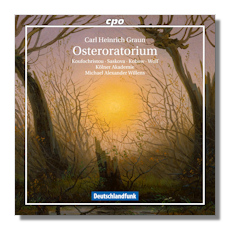
The Internet's Premier Classical Music Source
Related Links
- Graun Reviews
- Latest Reviews
- More Reviews
-
By Composer
-
Collections
DVD & Blu-ray
Books
Concert Reviews
Articles/Interviews
Software
Audio
Search Amazon
Recommended Links
Site News
 CD Review
CD Review
Carl Heinrich Graun

Easter Oratorio
- Osteroratorium, GraunWV Bv:IX:21, 20, 16, 10
Nina Koufochristou, soprano
Dagmar Saskova, contralto
Jan Kobow, tenor
Andreas Wolf, bass
Kölner Akademie/Michael Alexander Willens
CPO 777794-2
Carl Heinrich Graun lived from 1703 to 1759 and worked in the Prussian court at Berlin. After his death he was chiefly remembered for his Passion Cantata, Der Tod Jesu, GraunWV B:VII:5 (Hyperion CDA67466). The reception of that work, fine though it is, has overshadowed the composer's other choral and instrumental output.
Now here's a splendid performance (the only one in the current catalog) on cpo from the Kölner Akademie and four excellent soloists under Michael Alexander Willens of Graun's Osteroratorium (Easter Oratorio)… GraunWV Bv:IX:21, 20, 16, 10 which could well revive interest in a late Baroque composer who wrote in a distinctive and eminently "solid" idiom. Not that it wasn't also imaginative and full of invention in its own right. It was – and this performance makes the most of its individuality and strengths.
This Easter Oratorio is just over an hour in length. It's divided into four parts, which were intended for performance on the three successive days of Easter, then the Sunday following. Each is a cantata in its own right. In some ways their concatenation (as here) into this unified work is speculative. But it makes perfect musical sense. And has been conceived and successfully performed as a unity by Willens: after all to consider the biblical narrative is to see such a progression.
The first and third cantatas contain three arias, the second two and the much shorter (at under seven minutes only) fourth just one. An ensemble chorus opens and closes each cantata too. There are otherwise recitatives and accompagnati to give each cantata depth. In their different ways each is full of character and color. With a work from a corner of the repertoire that could perhaps be considered "minor", certainly not mainstream, a perfunctory flattening of the character of these components was a very real danger. Not in Willens' conception; nor in the execution of his forces here. There is a pep and energy which one might not expect from a composer for whom comparisons with Bach (and Handel) are always likely. Indeed "Jesus ist erstanden" [tr.15] could have been treated as a lesser "Jesu, meine Freude". But it wasn't. Willens allows it to express the joy of the Resurrection without needing props or re-enforcement of any kind.
The soloists (especially Kobow's tenor and Saskova's contralto) are clearly at home in the work and its sonorous world. Their articulation is clear and clean without ever being fussy. Their delivery is "forward" without straying into ostentation. The Kölner Akademie (two dozen instrumentalists and four other singers) is of relatively recent formation; there appears to be only on other CD by them currently on the books. Although they perform works from the seventeenth to the twenty-first centuries, they employ period instruments when the work calls for it. In this case, it has to be said, they make a splendid sound. There is a fortunate blend between focus (phrases sung and performed with precision and awareness of the Oratorio's overall liturgical purpose – "Mein Herz singt" [tr.11] is a good example), on the one hand: the pace is discernible and never lingers. And a delight and gusto, where the music comes alive on more than one level, on the other. Two results are that the listener is left with a clear memory of the music; and (hence) a desire to listen again… nothing is mundane or indistinct.
The acoustic (that of the Deutschlandfunk Chamber Music Hall) does everything to aid and project the soloists and ensembles. The recording, in fact, is to the customarily high standards of cpo. The same goes (by and large: it could have been more carefully proofed… words with "fi" have spurious splits) for the accompanying booklet, which contains background, biographies of the performers and full (track) listing and text in German and English. As said, Graun's style and compositional world are very much of their time. Yet the context of a work like this is universal; the Passion story is timeless. If it's a period or repertoire that attracts you, you are unlikely to be disappointed with this recording of the Osteroratorium as representative of the best of Graun's place in and contribution to it. If Graun is a composer with whom you are as yet unfamiliar, this is a good place to start.
Copyright © 2013, Mark Sealey





















